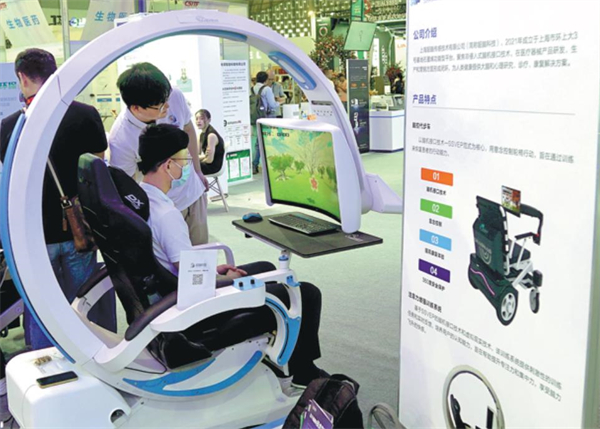
- Home
- Media Center
-
Events
- Wuzhen Summit
- Regional Forums
- Practice Cases of Jointly Building a Community with a Shared Future in Cyberspace
- World Internet Conference Awards for Pioneering Science and Technology
- The Light of Internet Expo
- Straight to Wuzhen Competition
- Global Youth Leadership Program
- WIC Distinguished Contribution Award
- Membership
- Research & Cooperation
- Digital Academy
-
Reports
- Collection of cases on Jointly Building a Community with a Shared Future in Cyberspace
- Collection of Shortlisted Achievements of World Internet Conference Awards for Pioneering Science and Technology
- Reports on Artificial Intelligence
- Reports on Cross—Border E—Commerce
- Reports on Data
- Outcomes of Think Tank Cooperation Program
- Series on Sovereignty in Cyberspace Theory and Practice
- Other Achievements
- About WIC
- 中文 | EN

BCI — the next frontier for high-tech business

A visitor experiences a brain-computer interface product during the ninth China (Shanghai) International Technology Fair on June 15. WANG GANG/FOR CHINA DAILY
During this year's Zhongguancun Forum, a tech event held in Beijing in late May, Zhao Zhiguo, chief engineer at the Ministry of Industry and Information Technology, said the BCI technology will be strongly supported to be an important development direction for China and accelerated efforts will be made to explore more application scenarios for the technology.
"China has been proactively pushing for BCI industry development. The country has made breakthroughs in key BCI projects and nurtured a number of leading BCI innovative enterprises. It also has built a BCI industrial alliance with more than 100 members across the industrial chain," Zhao from the MIIT said during the forum.
Zhao further said China attaches great importance to standard-setting. The MIIT, for instance, has supported companies and related research institutes to take the lead in drawing up BCI international standards. The ministry has also led the establishment of a technical committee to lay a solid foundation for BCI research standardization.
Notably, the level of independent research and development of chips and electrodes, two critical components in BCI technology, is constantly improving in China, Zhao said.
Agreed Gao from Tsinghua University. "The ultimate goal of BCI development is to realize full integration of human brain and machine as one organic whole. As both China and the US are striving to drive progress in BCI, the goal is likely to be achieved over the next 50 years."
Amid all this optimism about the race to the future, He Jianghong, a renowned expert in neurosurgery at Beijing Tiantan Hospital, sounded a note of caution, saying safety problems should be given special attention during the BCI technology's development.
"Attention should be paid to track whether a BCI device can be safely put into operation and become compatible for a long time, and whether it will cause direct damage such as infections, bleeding or other problems to users," He said. "Also, once this technology is widely applied, it will inevitably collect data like a large number of human brain signals, thus potentially raising privacy concerns."
So, it is important that China and other countries should address ethical issues and take precautions so that the BCI industry can develop in a healthy way, he said.

The World Internet Conference (WIC) was established as an international organization on July 12, 2022, headquartered in Beijing, China. It was jointly initiated by Global System for Mobile Communication Association (GSMA), National Computer Network Emergency Response Technical Team/Coordination Center of China (CNCERT), China Internet Network Information Center (CNNIC), Alibaba Group, Tencent, and Zhijiang Lab.





